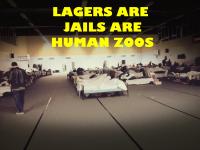Vivian is a young native of Syria who embarked on a lonely trip from Middle East to Germany, escaping from war and its collateral damage of unemployment, hunger and social chaos. Her journey through Germany has been characterized by symbolic violence, persecution, misogyny and abuse. Here are the facts described by the protagonist.
The story of Vivian begins in Lübeck a small town in Germany, where she arrived seeking asylum, staying there for five days. Vivian describes Her first refugee camp experience in Germany as a true disaster. She had to share a room with dozens of people, both women and men; the authorities did not provide information of any kind and discrimination became unbearable.
In this precarity and with no further notice, she was informed that there was no more room for her, forcing her to leave to Berlin. When she arrived to the LAGESO, the authorities informed her that there was no more place there either, leaving her no choice but to head to Frankfurt/Oder. And so she did.
A couple of hours after she arrived, the authorities confirmed her that ″due to lack of room″ she had to return to Berlin once again. Back in Berlin, a social worker informed her that there was still no place to receive her. In desperation, Vivian implored for a place to sleep and to take a shower. Without an official instruction, the social worker offered to Vivian a place in her parents’ house.
Vivian accepted and she stayed there for three days. This family welcomed her without asking anything in return; Vivian says that she won’t ever forget this humanitarian deed.
When the LAGESO finally deigned to offer her a place in a gym-camp Sporthalle Wiesenstraße – Herbert-Hoover-Oberschule in Wiesenstraße 56-58 located in Wedding in charge of BTB – Bildungszentrum GmbH, Vivian′s second odyssey began.
In this basketball court turned into a refugee camp, Vivian took a very active role officiating as an English/Arabic translator, reporting to the autorities what the people there needed. During the 20 days she was there, Vivian began to bring to the officer manager claims regarding sanitation and cleaning, the poor quality of food, the behavior of some security staff and the lack of privacy within the camp. Very reasonable demands considering that the camp was built on a basketball court where today survive 200 people without elementary social condition satisfied.
The Head of the camp told Vivian instead that she, as leader of the refugees, had to make a group of people clean the whole camp because some officials of the LAGESO would visit the facilities. They did but nobody came.
Responses to Vivian’s complaints got increasingly aggressive. Finally, the managing officer of the camp decided to arrange a meeting with all the people of the camp to show them a presentation. To everyone’s surprise, the presentation was instead used to insult the occupants accusing ′Arabians [of being] dirty′.
When Vivian tried to document this racist behavior, the authorities prohibited her to do so, threatening her with the possibility of being expulsed. A few days later, this threat became true; Vivian was relocated to another camp against her will.
Meanwhile, 200 refugees remain living in Sporthalle Wiesenstraße camp without the minimum humanitarian conditions to survive: an overcrowded space, without sufficient natural lighting, with poor air circulation and with only one common bathroom for all of them.
Pressekontakt/ press contact/ Contacto de prensa: 0152 - 19 27 26 05
via: http://haendewegvomwedding.blogsport.eu/?p=1478

